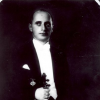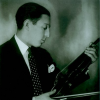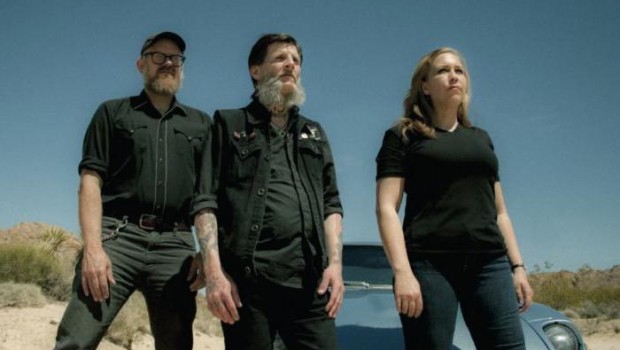Home » Jazz Articles » Interview » The Ditties: Finding Freedom in Swing
The Ditties: Finding Freedom in Swing

Courtesy Dainius ??pla
The Ditties channel the most exciting qualities of classic close-harmony acts, while incorporating song and storytelling elements that reflect not only their personal struggles and aspirations, but the complexities of an ever-evolving Lithuanian society.
Nina Simone
piano and vocals1933 - 2003
Typically, what drives an artist's ambition, is the desire to hold mastery over their medium. Whether for their own gratification, or to attract the attention of others, the artist wants to bend the established rules of their chosen discipline to their will. What makes jazz so special, is that mastery can come from embracing the moment-to-moment uncertainty of improvisation. One jazz trio that fully believed excellence came from musical freedom was the close-harmony group

The Boswell Sisters
band / ensemble / orchestraIn 1914, the sisters (Martha, Connie, and Vet) moved with their family to New Orleans. With their father being a former vaudevillian, the home was always full of music. In fact, the sisters' parents, along with their aunt Mattie and uncle Charlie, formed a barbershop quartet. Wanting their children to evolve beyond the vaudeville circuit, the sisters' parents soon enrolled them in classical piano, cello, and violin studies under the tutelage of Tulane University professor Otto Finck. Although they were performing recitals throughout the area, it was the city's jazz scene that interested them the most. In a 1925 interview with the Shreveport Times, Martha said, "We studied classical music... and were being prepared for the stage and a concert tour throughout the United States. But the saxophone got us."
Although the sisters had the luxury of living in one of the epicenters of jazz culture at the turn of the 20th century, what allowed more popular dance bands and jazz music to gain widespread exposure was the growth of radio broadcasting in the 1920s. Starting in 1923, listeners across the United States could hear the

Fletcher Henderson
arranger1897 - 1952

Don Redman
arranger1900 - 1964
The reach and influence of these emerging styles was not limited to the United States and Western Europe. In fact, because of the growth of radio broadcasting in the 1920s, many Eastern European nations began hearing popular dance bands and jazz music as well. One nation in particular that was, and still is, enamored by jazz was Lithuania.
According to Lithuanian musicologist RЁұta Skudien?, after Lithuania proclaimed its independence in 1918, and after several difficult years of stabilizing the new nation, the citizens desired a heightened culture; one that would include new forms of communication and entertainment. Soon, spacious and elegant cafЁҰs, like the Konradas and the Metropolis in the city of Kaunas replaced dark, crowded inns. And in 1926 the local broadcaster, Kaunas Radiophone, began regular broadcasts of American and Western European dance and jazz hits. Here, local jazz bands led by the likes of

Moishe Hofmekler
violin1898 - 1965

Daniel Pomerantz
violin1904 - 1981

Wynton Marsalis
trumpetb.1961
The freedom, joy, collaborative spirit, and endless innovation that can blossom from jazz mirrors the soul of the Lithuanian nation, which may be why

The Ditties
band / ensemble / orchestraFormed in Vilnius, the group is comprised of RЁұta ?vipait?, Veronika ?i?inskait?-Golovanova, and RЁұta Jakulyt?-Val?iukien?. Like The Boswell Sisters, the group blends intricate harmonies and song arrangements with scat singing, instrumental vocal imitation and a variety of tempo and meter changes. Impressively, the group channels the most exciting qualities of classic close-harmony acts such as The Andrews Sisters and The Dinning Sisters, while incorporating song and storytelling elements that reflect not only their personal struggles and aspirations, but the complexities of an ever-evolving Lithuanian society.
Here, The Ditties speak about their music and what keeps them inspired.
All About Jazz: We wanted to start by asking how you all met and decided to form this group? Were each of you drawn to music from an early age?
RЁұta ?vipait?: Well, The Ditties formed in 2011 when Veronika and I were studying jazz vocals at the Lithuanian Academy of Music and Theatre. At that time, we realized there was no vocal jazz trio in Lithuania, so we decided to fill that gap by singing early swing music. In the beginning, we took a lot of inspiration from and performed pieces by The Andrews Sisters, The Boswell Sisters, and The Dinning Sisters. Later, as our repertoire continued to grow, we began adapting our style to reflect popular English and Lithuanian pop songs, and have now concentrated on creating our own original compositions. You see, I grew up with music and studied it from an early age. It is safe to say that I knew that I would be a musician even when I was in the first grade. I am glad that I chose and continue to move down this musical path.
Veronika ?i?inskait?-Golovanova: Yes, and it's important to emphasize that when we sought to fill this musical gap in the Lithuanian jazz scene, it received a lot of support from the community.
RЁұta Jakulyt?-Val?iukien?: And for me, I wanted to be a singer for as long as I can remember. It was always my dream and I never questioned it. According to my mother, even before I was able to talk, I would repeat and mimic every melody that was sung to me. Being a part of this group has been a dream come true. I joined The Ditties three years ago. Before that, I would sing solo, but I knew RЁұta and Veronika and was a big fan of their work. Not many fans get to join their idols, so this has been a great experience. I got to learn from them a lot and bring my own ideas into light.
AAJ: Lithuania has such a rich jazz history, especially when it comes to big-band style jazz. What was it about jazz that interested you so much, and are there any particular jazz artists that have inspired you?
R?: Lithuania has a very colorful jazz palette now. In fact, this new generation of jazz artists continue to surprise and surpass their teachers. We have amazing creators who represent Lithuania in the world of jazz. I was shaped by listening to a lot of music, especially during the years of my studies when I was young and hungry to get to know as much as possible about more obscure styles of music and artists. I remember visiting a jazz festival where a popular Lithuanian saxophonist named

Liudas MockЁұnas
saxophoneb.1976

Marc Ducret
guitarb.1957
Of course, I am still inspired by the great mothers of jazz, such as

Ella Fitzgerald
vocals1917 - 1996

Sarah Vaughan
vocals1924 - 1990

Carmen McRae
vocals1920 - 1994

Gregory Porter
vocalsb.1971
Lianne La Havas
vocals
Raul Midon
vocals
Avishai Cohen
bassb.1970

Esbjorn Svensson
piano1964 - 2008

Etta James
vocals1938 - 2012

Sam Cooke
vocals1931 - 1964

Aretha Franklin
vocals1942 - 2018
 "
data-original-title="" title="">Earth. It all depends on my mood. Additionally, a lot of my inspiration continues to come from my family and my interactions with other people.
"
data-original-title="" title="">Earth. It all depends on my mood. Additionally, a lot of my inspiration continues to come from my family and my interactions with other people. V?G: And like RЁұta, I fell in love with jazz music when I started studying at the Lithuanian Academy of Music and Theatre. I've always been fascinated and compelled by the improvisational elements within jazz music. Here, through improvisation, there are endless possibilities to create feelings of never-ending freedom. Jazz music is also rich in its harmony and melodic lines. Personally, I am inspired by jazz performers who use all their vocal capabilities, such as

Kurt Elling
vocalsb.1967

Bobby McFerrin
vocalsb.1950

Betty Carter
vocals1929 - 1998
RJV: Yes, like RЁұta and Veronika, I love listening to artists such as Betty Carter, Ella Fitzgerald, Bobby McFerrin and

Louis Armstrong
trumpet and vocals1901 - 1971
AAJ: And what's great about your songs is the unexpectedness of them. Although it seems you enjoy producing a familiar style of jazz, you also tend to infuse each composition with these innovative and exciting elements. This is especially true when it comes to the vocal complexity of your songs. I'm thinking of the playfulness in songs like "Moterys" or "Myliu Tave," or utilizing laughter in "Ka?kas atsitiko."
Can you talk a bit about your approach to songwriting? Where do your ideas tend to come from, and what is most important to you when coming up with a song or composition?
R?: To be honest, ideas tend to come at very unexpected times—while walking, driving in the car, or just lying in bed. In those moments, I'll usually grab my phone and write down the new ideas, whether they are lyrics or a melody. Later, songs will be born from these moments. For example, when I wrote "Moterys" (Women), the idea was to capture the complex relationship between men and women, but told in a playful and witty way. In general, we like to think of ourselves as ambassadors of a good mood, so our songs are full of laughter, sarcasm and wit, but also femininity, lightness, tenderness and sensitivity.
V?G: For me, I have been involved in music since I was three years old. My mother was, and still is, a musician, so classical and choral music has always been a part of my life. Later, I started studying jazz music. I think all these aspects are of great importance to my musical ideas and my creativity. I have accumulated a lot of musical experience, so I try to use all of it in my creative work. When creating, freedom is the most important thing for me. I have to distance myself as much as possible from certain frameworks or standards. I have to think less about what will appeal to others, and listen more to my inner voice. Of course, from a technical point of view, creating for The Ditties has certain rules. The harmony has to be in septimal form, without complex atonal deviations, so that three voices can easily sing in a narrow range. As RЁұta said, playfulness within our work is also a very important component to me. We try to bring joy and light to our listeners, and I want that to be reflected in our creative work.
RJV: Yes, for me as well, inspiration for a song can really come from anywhere. Whether it's a beautiful painting, a scenic landscape, a funny memory, or unusual experience, it's all about creating a strong emotion within ourselves. For me though, I can never really create on demand. Inspiration must come to me on its own, and it usually comes when I least expect it. Oftentimes, it happens to me in the middle of the night in a dream. At that point, I quickly get up and write my ideas down before they evaporate. And for me, melodies usually come first and then I apply lyrics to the melodies later. I must admit that this is not always the easiest way to write songs. But usually during this process, the melody and lyrics morph into something completely different from the original idea. In the end, what is most important is the feeling that a song brings. It must make you feel something. It must capture the listener's attention. That is the main goal.
AAJ: What's great about jazz is that it has the ability to be both timeless and innovative at the same time; something I think your music is very successful at. Although The Ditties embrace a form of jazz that was very popular in the interwar period of the 20th century, it seems as if the power of the style hasn't lost any of its strength. Songs can be soothing, dreamy, or upbeat and make you want to dance.
What do you think it is about this type of jazz that never seems to go out of style, and continues to resonate with listeners from Lithuania and beyond?
R?: Well, when it comes to the music you perform or create, I think it is very important to know what you want to say. What is the message you want carried out? The Ditties have a very clear direction and are faithful to their chosen style, which I think captivates listeners in Lithuania and beyond. We enjoy what we do, and it is reflected in our songs and our unique image.
V?G: And the reason jazz music is so timeless is simply because it's art of the highest quality. When it comes to early jazz, the style performed by our group, it's very playful and its objective is to bring joy. This is probably not a coincidence because the style really took off during the war years, and this music acted as a tool to spread light and happiness. At the same time, although the music itself tends to be easy on the listener's ears, it's far from easy to perform. A singer or musician performing this type of music must be a true professional and understand the subtleties of jazz; the swing technique; phrasing, and must have a very well-developed ear. In the end, being a professional does not mean playing in a complex manner, it means playing tastefully.
RJV: Yes, the songs we sing are relatable. Even though at times they can be complex, they are also easy to listen to. As RЁұta said, our songs have a feminine, romantic, witty, feel-good vibe that tends to bring a smile. The swing elements are what make the music light and carefree. It really draws you in, and it's hard not to at least tap your feet or snap your fingers while you're listening to it.
AAJ: As artists, what continues to inspire each of you, and influence your approach to music composition? What do you hope to achieve artistically that you haven't yet?
R?: I really hope to never stop developing as a performer, a creator, and as a person so that I can unconditionally share my worldview on a variety of things. It is also my great wish that our group never stops surprising ourselves, and our listeners.
V?G: And for me, when it comes to music composition, what fascinates me the most is the freedom composers experience. The freedom to create. Also, this detachment from a certain set of standards. When you are free to create, you start to think more boldly and deeply. Here, the music becomes more unique and distinct in style. In my own work, that's what I always aspire to do; to attain complete freedom and uniqueness in my own creations.
RJV: You see, I have also studied musical theatre for three years. It would be wonderful to create a musical with The Ditties. I feel that all three of us have incredible artistic talent and could really create something original, fun, and compelling.
Tags
Interview
The Ditties
Matthew Vasiliauskas
Nina Simone
The Boswell Sisters
Fletcher Henderson Orchestra
Don Redman
Moishe Hofmekler
Daniel Pomerantz
wynton marsalis
The Andrew Sisters
The Dining Sisters
Ella Fitzgerald
Sarah Vaughan
Carmen McRae
Beady Belle
Gregory Porter
Lianne La Havas
RAUL MID?N
Moloko
Avishai Cohen
Esbjorn Svensson
Etta James
Sam Cook
Aretha Franklin
Queen
Earth, Wind and Fire
Kurt Elling
Bobby McFerrin
Betty Carter
Louis Armstrong
Comments
About The Ditties
Instrument: Band / ensemble / orchestra
PREVIOUS / NEXT
Support All About Jazz
 All About Jazz has been a pillar of jazz since 1995, championing it as an art form and, more importantly, supporting the musicians who make it. Our enduring commitment has made "AAJ" one of the most culturally important websites of its kind, read by hundreds of thousands of fans, musicians and industry figures every month.
All About Jazz has been a pillar of jazz since 1995, championing it as an art form and, more importantly, supporting the musicians who make it. Our enduring commitment has made "AAJ" one of the most culturally important websites of its kind, read by hundreds of thousands of fans, musicians and industry figures every month.






 Buy Now
Buy Now























